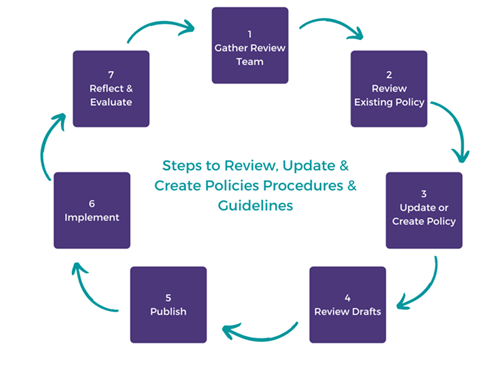Policy Support
The Munch & Move program encourages early childhood services to implement written policies, procedures or guidelines for nutrition, breastfeeding, physical activity and screen time.
Policies, procedures & guidelines (which will be summarised by the term policies from this point onwards) are important because they:
- Provide your service with a framework to promote and ensure best practice
- Communicate the values and expectations of your services to families and staff
- Ensure consistent communication with families and staff about the procedures that are undertaken in your service
- Provide practical information on how your service promotes child health
See our video below to find out more about the importance of policies and how to get started on developing your service policies.
Step 1.
Bring your policy review team together, considering any stakeholders you may need to consult along the way e.g. the board, committee, families.
Step 2.
Review your current policies by using this policy checklist.
Step 3.
If your existing policies require updating or you need to develop a new policy, see our resources below to support this process.
Step 4.
Once you have drafted your policies, think about who you need to consult before it can be finalised e.g. the board, committee, families etc. After consulting, make any relevant changes and finalise these documents.
Step 5.
Once your policies are finalised, share it with staff and families e.g., through meetings, newsletters, online platforms, displaying a copy in your foyer.
Step 6.
To facilitate implementation of any new or updated policies, ensure these are discussed in staff meetings and provide an opportunity for staff to troubleshoot any issues or plan future amendments.
Step 7.
Reflect on and evaluate your policies. This should be an ongoing process decided by your service e.g. during staff meetings, specific policy meetings etc. A yearly review is recommended to provide an opportunity to update and include any new evidence.
These steps allow for culturally appropriate consultation with families and community members. It is important to understand the cultural and social context in Australia, and that many policies and programs are designed for non-Aboriginal children.
If your service has Aboriginal children is it is important that your service involves Aboriginal stakeholders in this process. Not involving Aboriginal stakeholders could result in policies and programs that do not meet the needs of, or are not viewed as being relevant for children attending your service.


|
Full Nutrition Policy Template
|
|
Nutrition Guidelines Insert
|
|
Australian Dietary Guidelines
|
|
Nutrition Commitment Statement
|

|
Full Screen Time Activity Policy Template
|
|
Screen Time Guidelines Insert
|
|
Australian 24-Hour Movement Guidelines for the Early Years (Birth to 5 Years)
|
|
Small Screen Recreation Commitment Statement
|

Having policies that reflects the key policy elements from Munch & Move, shows your service's commitment to the Australian Guide to Healthy Eating and the 24-hour movement guidelines for children aged birth to 5 years.
Updating policies can be quite a large task to undertake so the Northern Sydney LHD have created a resource for you to show your support to the policy elements. Display this poster in your service to educate families, carers and staff on your commitment to breastfeeding, nutrition, physical activity and reducing small screen time. 
For more policy support or to arrange a free policy review, contact your local Health Promotion Officer or email the good for kids team on HNELHD-GoodForKids@health.nsw.gov.au.
We would like to acknowledge the Healthy Eating Advisory Service's Developing a Healthy Eating Policy webpage as inspiration for this webpage.


